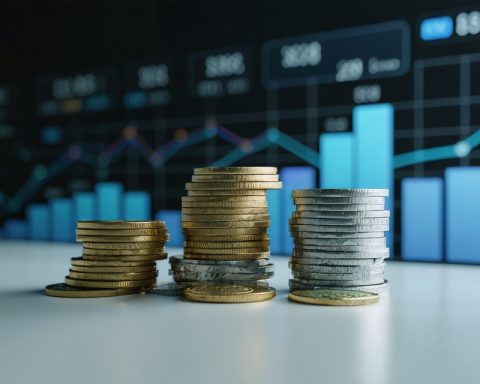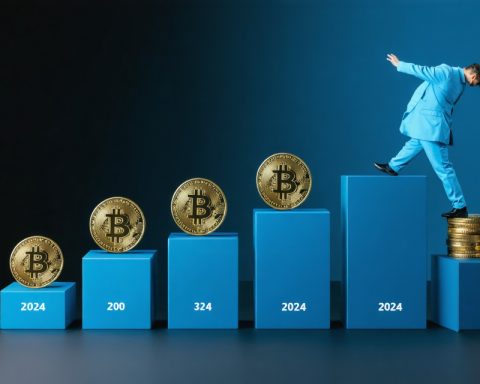- President Trump’s tariffs, aimed at protecting American industry, raise concerns about potential corruption and personal gain over public good.
- The policy’s arbitrary structure and special exemptions could encourage favoritism and unethical negotiations.
- Market analysts and policy experts warn of long-term negative effects on trade dynamics and global supply chains.
- Critics point to historical tendencies of Trump’s administration merging personal and political interests, with consequences for transparency.
- The lack of clear multilateral agreements underlines concerns, highlighting the opaque motives behind the tariffs.
- Foreign and domestic markets face instability, with economic and diplomatic repercussions potentially significant.
- Proponents see tariffs as tools to bring jobs back and protect national industries, though critics caution against protectionism.
- Public oversight and transparency are crucial to ensure economic policies serve national welfare, not a privileged few.
President Donald Trump’s latest round of tariffs, designed ostensibly to protect American industry, is raising alarms among critics for laying fertile ground for potential corruption. The program, marked by its arbitrary structure and special industry exemptions, could significantly alter trade dynamics while inviting ethical scrutiny. Market analysts and policy experts alike express concern about the long-term effects, warning that the broad discretion embedded in the new policy creates opportunities for backdoor negotiations and favoritism.
Across the economic heartland and through the corridors of Washington, debate echoes about whether these tariffs are strategic economic levers or tools for political quid pro quo. Voices like those of Public Citizen’s Melinda St. Louis highlight the potential for increased graft, pointing to past instances where policy seemed more about personal gain than public good. This fear is not rooted in paranoia but history. Trump’s administration previously exhibited tendencies toward merging personal and political interests, with his businesses often benefiting from decisions made within the Oval Office.
Even the internal structure of these tariffs, with its myriad exceptions and provisions, seems like a page from the playbook of economic brinkmanship. Corporations now vie not only on the open market but for special dispensation directly from the administration. The labyrinthine nature of these carve-outs under the current regime conceivably positions power and profit in dangerous proximity.
Consider the anecdotal evidence: the swift exemption of the fossil fuel industry, paired with private demands for political contributions, adds color to a canvas already painted with suspicions. Economists like Rajeev Goel note the concerning sketch this paints. Unlike transparent multilateral agreements fostering fair trade, such unilateral tariffs muddy the waters and obscure motives.
The alarm bells ring far beyond just ethical concerns. The potential destabilization of the global supply chain, coupled with the unpredictable nature of tariff implementation, threatens both domestic markets and international relations. Foreign governments could find themselves in a precarious dance of diplomacy and negotiation, navigating Trump’s transactional approach where end goals may shift with the political winds and personal benefits.
Yet, amid these brooding clouds, some view tariffs as opportunities. Advocates argue they can redirect lost jobs back home and fortify national industries against foreign competition. But the cost – if mismanaged – could be monumental: a loss of credibility, a weakened economy, and a return to protectionist policies that history has shown to be counterproductive.
The real battle, unfolding quietly behind closed doors and across global economic tables, will be one of integrity. For the American people, the key takeaway is vigilance. Public oversight and transparent policy must reign to ensure that economic policy advances merely the nation’s welfare and not the interests of a privileged few. The futures of workers, industries, and economies hang in the balance, poised on the edge of strategy or scandal.
Are Trump’s New Tariffs a Tool for Economic Growth or a Breeding Ground for Corruption?
Understanding President Trump’s Tariff Policy
President Donald Trump’s recent imposition of tariffs has generated significant debate regarding their economic and ethical implications. Designed to protect American industries, these tariffs have introduced concerns about potential corruption due to their arbitrary nature and special exemptions for certain industries. The potential for misuse and favoritism has drawn criticism, highlighting the urgent need for transparency and ethical oversight.
Key Concerns and Potential Implications
1. Economic and Ethical Alarm Bells:
– Critics argue that the discretionary power embedded in these tariffs allows for favoritism, where specific industries receive beneficial exemptions, possibly in exchange for political favors. This proximity of power and profit poses risks to fair trade practices.
– Ethical concerns are exacerbated by historical precedents of personal interests merging with political decisions within the Trump administration. This scenario is not without historical precedents, where personal gain has overshadowed public good.
2. Impact on Global Trade and Supply Chains:
– The erratic implementation of tariffs could lead to destabilization of global supply chains, posing challenges for both domestic and international markets. This may incite retaliatory policies from other countries, further complicating international relations.
– The unpredictability of this tariff approach could strain diplomatic ties, forcing foreign governments into negotiations that may focus more on appeasement than mutual agreement.
3. Domestic Market Dynamics:
– On the home front, the special exemptions granted to industries like fossil fuels have raised eyebrows. Such moves suggest possible political motivations, potentially leading to a misallocation of resources and economic inefficiencies.
– Advocates argue that tariffs can bolster local industries and protect jobs, yet the potential for adverse economic consequences cannot be ignored. A poorly managed tariff regime risks reverting to isolationist policies detrimental to long-term economic health.
Proactive Measures and Recommendations
– Vigilance and Oversight:
Vigilance is essential to ensure that tariffs serve national interests rather than the privileged few. Public transparency and rigorous oversight mechanisms can help safeguard against corruption and ensure that economic policies genuinely advance the nation’s welfare.
– Strategic Policymaking:
Crafting and maintaining clear, fair, and transparent tariff policies can mitigate potential risks. This includes setting up structured review frameworks to evaluate the efficacy and ethical transparency of exemptions granted.
Future Predictions and Trends
– Shift Towards Sustainable Practices:
Moving forward, there may be a trend towards integrating more sustainable and transparent trade practices. Industries may lean on innovation and ethical strategies rather than relying heavily on government protectionism.
– Technological Influence:
Technology will continue to play a crucial role in reshaping global trade relations. Embracing digital solutions for transparency might help mitigate issues of corruption and inefficiency.
Conclusion
President Trump’s tariffs put America at a crossroads between strategic economic growth and potential ethical pitfalls. The dilemma highlights the necessity for transparent, fair, and strategically sound policymaking. The future of global and domestic trade relations may depend significantly on how these concerns are addressed.
For further information on the political and economic ramifications of such policies, visit Reuters.
Quick Tip for Decision-Makers:
Ensure your decisions and plans factor in both short-term gains and long-term sustainability. Transparency and public accountability are key in maintaining trust and ensuring positive outcomes for all stakeholders involved.













